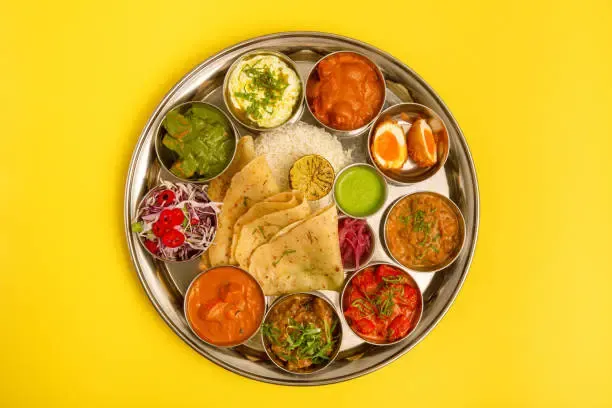January Sees Drop in Home-Cooked Thali Prices

Synopsis
Key Takeaways
- Vegetarian thali prices decreased by 9% in January.
- Non-veg thali costs fell by 4% month-on-month.
- Tomato prices fell 34%, impacting thali costs.
- Year-on-year, vegetarian thali prices rose 2%.
- Retail inflation decreased to 5.22% in December.
New Delhi, Feb 6 (NationPress) The expense of a home-prepared vegetarian thali saw a 9 percent decrease in January this year compared to December, while the cost for a non-vegetarian thali dropped by 4 percent month-on-month, as per findings from Crisil Ratings.
This reduction in prices can be attributed to a significant 34 percent fall in tomato prices due to the influx of fresh rabi crop into the market.
Additionally, a 16 percent decrease in potato prices and a 21 percent drop in onion prices also played a role in diminishing the total cost of thalis.
On the other hand, the price of a non-veg thali decreased at a slower rate, influenced by an estimated 1 percent increase in broiler prices month-on-month, according to the Crisil report.
However, when looking at year-on-year statistics, the cost of a vegetarian thali rose by 2 percent in January, whereas that of a non-vegetarian thali surged by 17 percent due to the increased cost of chicken compared to a lower base last year.
The rise in non-veg thali prices was primarily driven by a 33 percent yearly increase in broiler prices, which comprise around 50 percent of the overall cost of a non-veg thali. This price surge reflects a low base from last year when prices plummeted due to oversupply.
Potato prices increased by 35 percent from a low base last year, reaching Rs 31 per kg in January 2025 from Rs 23 per kg in January 2024. Prices of pulses and cooking oil also saw a yearly rise.
Conversely, a 11 percent year-on-year decline in LPG fuel costs (to Rs 803 per 14.2 kg LPG cylinder in Delhi from Rs 903 last year) provided a partial offset to the increase in other ingredient prices.
Meanwhile, India’s retail inflation rate, as indicated by the Consumer Price Index, dropped to a 4-month low of 5.22 percent in December, largely thanks to the easing prices of vegetables, pulses, and sugar, which brought relief to household budgets, according to data from the Ministry of Statistics.
The decline in inflation reflects a consistent downward trend after reaching a 14-month high of 6.21 percent in October. CPI inflation fell to 5.48 percent in November.
The decrease in retail inflation during December was attributed to the moderation of price increases in crucial food items.









